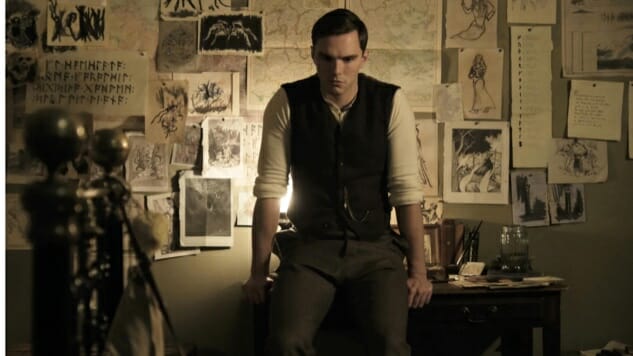
Almost every fantasy epic tells the tale of magical lands and races, intimidating hordes of violent creatures and awesome dragons, underdogs heroically defying seemingly insurmountable foes, but almost none are as iconic and inspirational as J.R.R. Tolkien’s Middle-Earth. The reason why Tolkien’s The Hobbit and The Lord of the Rings (and The Silmarillion if you want to be extra thorough) represent genre-defining literary classics isn’t solely because of the creatures that populate their pages or the plot.
It’s the distinct way Tolkien tapped into humanity’s dogged resilience against even the most inconceivable tyranny and carnage, finding hope and light in even the darkest of times, kindled with the indestructible bonds of fellowship. The movie Tolkien, a superb biopic about the earlier years of the author (Nicholas Hoult) that focuses on his time as a student in Oxford and subsequently as a traumatized soldier during World War I, fully understands the thematic fuel that allowed his Middle-Earth to grab hold of readers. That’s why, instead of direct and easy fan service in the form of a traditional biopic that covers Tolkien’s entire life—with of course an emphasis on the decades when he wrote his quintessential work—we get a story that focuses entirely on how the moral and spiritual narrative foundation of his stories were laid.
The film divides Tolkien’s major personal influences into three groups of people. The first is his loving mother (Laura Donnelly) who, despite dying when Tolkien was young, instills the love of mythical stories into her children, as well as the importance of how they can be used to navigate real-life conflict. The subtle ways the first act incorporates how Tolkien was eventually influenced by the details of these myths carries itself to the rest of the film. Screenwriters David Gleeson and Stephen Beresford, as well as director Dome Karukoski, don’t hit us over the head with imagery that clearly inspired Middle-Earth iconography, but find ways of keeping them in the periphery while retaining emphasis on emotional and thematic development.
For example, it’s obvious how Wagner’s Ring Cycle shares similarities with Tolkien’s work, right down to a ring of power that the characters are battling after. Instead of a superfluous sequence which would show Tolkien having his eureka moment while watching the show, it’s used instead as organic romantic build-up between Tolkien and his girlfriend, Edith (Lily Collins), as the couple reenact the opera behind the stage after not being able to get in. The second influence on Tolkien is of course Edith, who should not be an unfamiliar name for those with even cursory knowledge of his biography.
In most biopics about important men of the 20th Century, the identity of the female companion is relegated to only support the male protagonist. She doesn’t have any personality or characteristics outside of the man’s identity or storyline. A Beautiful Mind, The Theory of Everything, take your pick. That’s why while Tolkien’s lost in his own inner conflict about pursuing his writing versus making a practical living, it’s refreshing to see a passionate sequence where Edith lays out the fact that she, and in turn women of the period, aren’t even given that choice. Her passion is music, and she can’t even pursue an education, let alone a career in it. It’s a sobering moment that takes the viewer out of the protagonist’s bubble.
The relationship between Edith and Tolkien, supported greatly with the intimate chemistry between Hoult and Collins, also brings out an offset of creativity that’s rarely exposed in films about the subject. We’ve seen many scenes about the intoxication or the exhilaration of imagination, but rarely do we get sensuality. A wonderful sequence where Edith and Tolkien go on their first date and create a story based on their favorite myths, slowly transitioning into subtle physical connection, visualizes the inherent ecstasy of unbound imagination.
The third and most prevalent influence on Tolkien is his indestructible friendship with his fellow artists from Oxford, who form themselves into a group called the Tea Club Barrovian Society, or TCBS. This support group forms the foundation of Tolkien’s eventual Fellowship, as the unbreakable bond and support between the friends inspires them to stand up against authority figures who consider their art silly distraction rather than a lifetime’s passion. Thus, we get a mini Dead Poets Society hidden inside a Tolkien biopic. Later, during World War I, they find hope within each other as everything looks bleakest. The film uses the framing device of Tolkien looking for one of his TCBS friends in the battleground to explore how the horrors of the war inspired Sauron and other villainy in his work. Again, there’s some imagery that makes this clear, like flamethrowers turning into fire-breathing dragons, but we’re not hit over the head with it. I especially enjoyed looking at the peripheries of the war footage to see Sauron’s silhouette forming in the background.
If there’s one thing worth nitpicking, it’s the use of switching between younger and adult actors when depicting Tolkien and his TCBS friends. Merely a year or two passes in the story, yet suddenly we get a brand new set of actors portraying these characters as they get older. Of course this is common in biopics, but usually at least five years or so passes in order to justify it. Here, it’s a bit jarring. Regardless of such minor quibbles, Tolkien is a biopic that should satisfy fans.
Director: Dome Karukoski
Writer: David Gleeson and Stephen Beresford
Starring: Nicholas Hoult, Lily Collins, Colm Meaney, Derek Jacoby, Patrick Gibson, Anthony Boyle, Tom Glynn-Carney
Release Date: May 10, 2019
Oktay Ege Kozak is a screenwriter, script coach and film critic. He lives near Portland, Ore., with his wife, daughter, and two King Charles Spaniels.